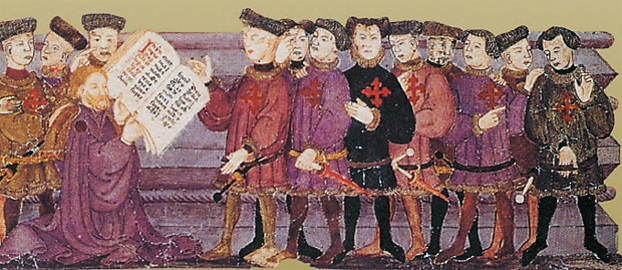Conference to explore patronage of sacred books
How royal courts, religious institutions and elites influenced production

Detail from the title page of the Aragel Bible, a Castilian translation by the Jew Moses of Aragel, completed for the Christian patron the Duke of Calatrava in 1422. The image shows Aragel handing the book to his patron.
Sacred texts -- Jewish Bibles, Christian Bibles, Qur´ans, prayer books, psalters, haggadot, translations of and commentaries on Scripture -- were at the center of book production for Jews, Christians and Muslims throughout the Middle Ages. Production efforts were supported by royal courts, the religious elites of several faiths, the educated classes and others of means.
A look at this extensive system of patronage, which played a central role in the production of the texts, will be the focus of an international conference “Patronage and the Sacred Book in the Medieval Mediterranean,” to be held October 18 and 19 in the International Lounge, Usdan Student Center.
“We will investigate how systems of patronage encouraged, influenced and controlled the production of sacred texts and knowledge concerning such texts, as well as the ways in which the physical characteristics of the texts tell stories about how they were used and interpreted,” says Professor Jonathan Decter, Edmond J. Safra Professor of Sephardic Studies in the Department of Near Eastern and Judaic Studies. “We have a particular interest in how texts were read and recast across religious boundaries – Latin translations of the Qur’an, Christian scholars consulting Jewish scholars on Hebrew books, Jews employing Christian artists in producing luxury manuscripts.”
Also to be explored: How patronage in the royal court differed from patronage in other contexts, such as the Roman Catholic Church, religious orders, madrasas, universities, the circles of learned elites and non-institutional settings; and the role women played in the patronage, production and circulation of the books.
The conference, which is free and open to the public, will bring together scholars from the United States, Europe, North Africa, and the Middle East, and will examine patronage throughout the medieval Mediterranean -- from Spain, North Africa, southern France, Italy and the Levant -- a region that was home to a dynamic population of Muslims, Christians, and Jews.
In many ways, Decter said, the program anticipates the upcoming lecture "Readers and Books in Renaissance Europe," which is to be delivered October 26 by Professor Anthony Grafton of Princeton University at the inauguration of the Mandel Center for the Humanities.
“Patronage and the Sacred Book” has been sponsored through a four-year grant "The Intellectual and Material Legacies of Late Medieval Sephardic Judaism: An Interdisciplinary Approach," supported by the European Research Council. The conference has been organized by the Consejo Superior de Investigaciones Cientificas and the Tauber Institute for the Study of European Jewry.
The Tauber Institute, founded in 1980 by Dr. Laszlo N. Tauber in honor of his parents, describes itself as “devoted to the study of modern European Jewish history, thought, culture and society,” and brings scholars in who specialize in those and other areas.
Categories: Humanities and Social Sciences, International Affairs, Research





